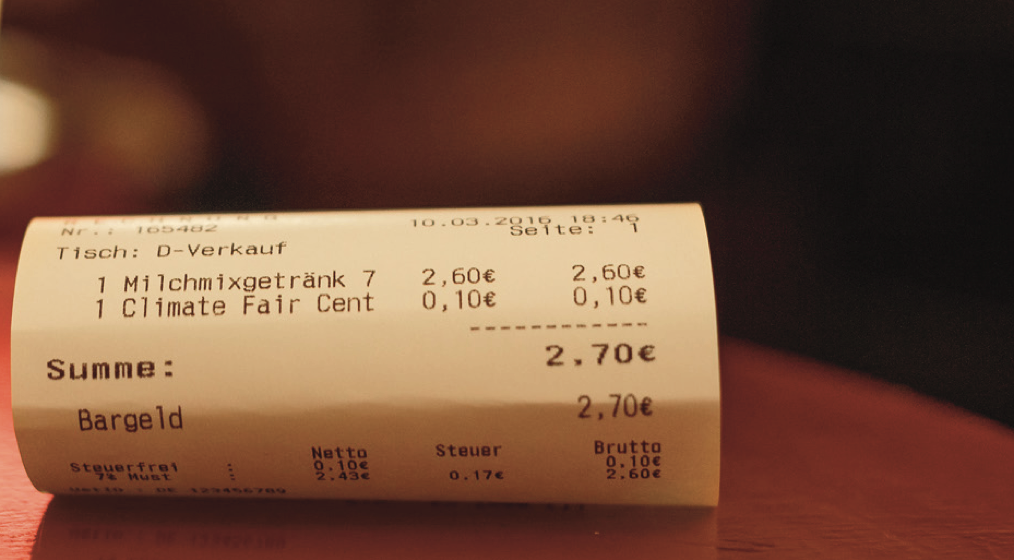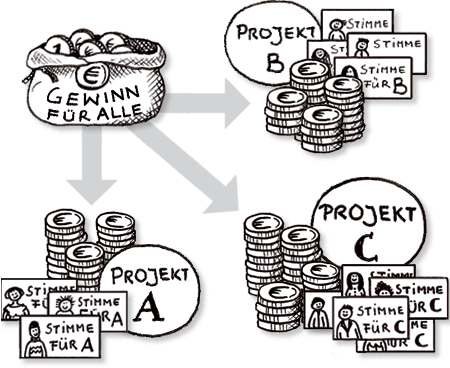Klimaschutz+ offers a platform and tools that address climate change mitigation and adaption, poverty-alleviation, and the need to develop a culture of nonviolence.

logo
source ![]()
This panel describes how Klimaschutz is peer governed.
xxxxx
# Peer Governance in the Commons
We've centralized the administration but decentralized the power especially over the use of money. [DB: WHO IS BEING QUOTED HERE? SOME I.D.IS NEEDED]
Participants in Klimaschutz+ Declare Shared Purpose & Values through the organization's statutes, which were developed by the founders. {DB: UNCLEAR. HOW CAN PARTICIPATANTS DECLARE SHARED PURCHASE AND VALUE IF THEY DID NOT DEVELOP THE STATUTES IN THE FIRST PLACE?]

Logo source ![]()
When asked about how they Keep Commons & Commerce Distinct, Peter Kolbe used an interesting example: The project climatefair2go. html ![]() . Its idea is simple, Respect Human Dimensions, take your time and enjoy your coffee." [DB:??? PROJECT EXPLANATION IS VERY UNCLEAR, BOTH HERE & IN PARAGRAPH BELOW. I'M ALSO NOT SURE HOW THIS KEEPS COMMERCE & COMMONING DISTINCT....OR HOW THIS RELATES TO PEER GOVERNANCE.]
. Its idea is simple, Respect Human Dimensions, take your time and enjoy your coffee." [DB:??? PROJECT EXPLANATION IS VERY UNCLEAR, BOTH HERE & IN PARAGRAPH BELOW. I'M ALSO NOT SURE HOW THIS KEEPS COMMERCE & COMMONING DISTINCT....OR HOW THIS RELATES TO PEER GOVERNANCE.]
Climatefair2Go is a nudge not to use one-way-cups for coffee for ecological reasons. It cooperates with many coffee-shops who provide background information to costumers as well as simple alternatives. If people decide for a one way cup, they pay 0,10 Euro extra.
The project's goal is not to sell, but to go bankrupt: [
DB: "BANKRUPT" IS NOT THE CORRECT TERM TO USE HERE. THE COFFEE SHOPS WILL STILL BE IN BUSINESS.]

The Climate Fair2Go 10cents are added to the bill.
source ![]()
We want to go bankrupt with this, then we would have reached our goal. Actually, the sales figures are our control mecanism. We check each month if the sum becomes smaller. If it doesn't, we need to adjust the project. The ideal is, not to sell ANY one way cup anymore.
POST http://image-transporter.apps.allmende.io/image
The conversation about how they Set Semi-Permeable Boundaries has been as interesting as listening to their climatefair2go philosophy.
Take monastery walls. They clearly separate what is inside and outside. But portals are part of these walls. Always. The portals basically invite everybody to enter this "other inside world with its different set of rules." So, this "boundary with portals" invites and protects. A boundary only becomes a problem when portals aren't an integral part of it. (Peter Kolbe)
Many decisions are taken collectively. Many of these occur online since this is the best way to Assure Commoners' Consent in Decisionmaking when people can't meet face-to-face. Anyone who contributes something to the foundation are entitled to take part in the decisionmaking process.
In practice, these decisionmaking processes vary greatly. Some very quick and easy because people trust the project's advocate -- [Trust Situated Knowledge] -- while other groups have more trouble reaching agreement. [DB: ANY DETAILS ON THIS?]
Within the different project groups and teams -- a core group has five members, a bigger group around fifteen members -- people have an open deliberation and then make decisions are based on consensus. If there is significant disagreement, people use majority vote or the Systemic Consensus Principle html ![]() .
.

Finance Commons Provisioning at Klimaschutz+.
source ![]()
Since its founding five years ago, there has been only one decision that did not come through consensus. In that case, somebody insisted that a project could begin only after enough money had been raised to fund a job to manage the project.
The Klimaschutz+ Web platform is lively because people Share Knowledge Often & Widely. The Klimaschutz+ website and a regular newsletter html ![]() provide any information that participants need.
provide any information that participants need.
As advocates of radical transparency in economic decisions, the project strives for open accounting. But they can hardly do so when working with market players and public funding. [DB: WHY NOT? CAN YOU EXPLAIN THE PROBLEM?]. However, they Honor Transparency in a Sphere of Trust html ![]() , that is, within the organization. Three steps have been taken:
, that is, within the organization. Three steps have been taken:
- To be part of the self-obligating "Initiative Transparent Civil Society" [DB?? EXPLAIN.] - To care for transparent accounting [???] - To respect the Social Reporting Standard [???]
Given the fact that Klimaschutz+ was not allowed to make "each accounting line" transparent, [DB: WHY NOT? WHO PROHIBITED IT?] the mid-term solution has been to allow all project partners 100% access and examination rights of financial accounts.
The best way to describe the Klimaschutz+ way to Relationalize Property, Finance Commons Provisioning and Protect & Extend Value Sovereignty is to follow the flow of money within the institution. Each individual contribution or "investment into a sustainable future" -- as they call it -- goes to the Klimaschutz+ foundation, which has the legally binding task to "foster the common good," as its legal charter requires. (Gemeinnützigkeit -> Förderung des Gemeinwohls.)
The insight is: all legal forms - also communal/ collective property - provide abundant loopholes. Who seeks for individual gain will manage to do so. The solution Klimaschutz+ came up with is to: {DB: THIS IS UNCLEAR TO ME. ARE YOU ARGUING AGAINST RIGOROUS LEGAL FORMS OF ACCOUNTABILITY? THE PARAGRAPH BELOW ON "HOW IT WORKS" IS NOT CLEAR AT ALL.]
Hack the cooperative law in Germany. We make sure that no profit is being reaped individually or privatized at any moment.
This is how it works: Klimaschutz+ (entity nr 1) is not allowed to invest, but in a "small cooperative" (= kleine Genossenschaft, entity nr 2. Small means: there is a maximum of 20 members. At least 50% of them need to be part of the foundations' council (Stiftungsbeirat), which is composed of qualified people of different areas.
All "small cooperative" members declared (cf. Declare Shared Purpose & Values, that their...
economic goal is a high 'return' in socio-economic terms and that they do without/abstain from getting paid a dividend in the long run. (Peter Kolbe)
This is the way Klimaschutz+ makes sure that the funds collected will be secured for collective purposes as laid town in the statutes. Ausschüttung in the long run) Damit ist dauerhaft sichergestellt, dass die Mittel in der kollektiven Nutzung bleiben.
As for the five renewable power stations: they are legally owned by the "registered cooperative", (eingetragene Genossenschaft), but financed with interest free credits or donations from Grameen Social Businees Investment. [DB: THIS EXPLANATION IS UNCLEAR. I DON'T GET WHY THINGS ARE DOING THIS WAY, OR WHY IT IS LEGALLY INGENIOUS, OR WHATEVER.]
# See also: Klimaschutz+, Solidarstrom Bremen